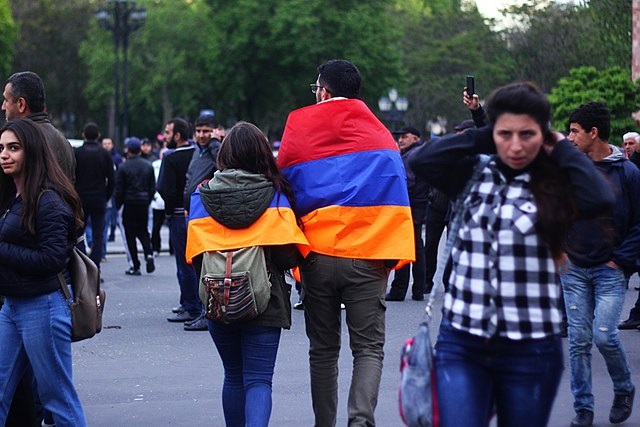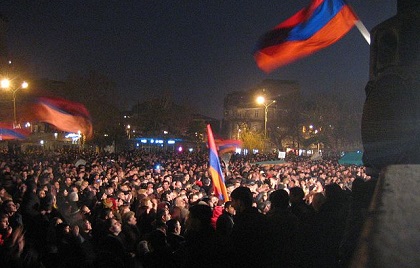“In Armenia, there is a whole corrupt system to dismantle”
A church leader speaks about the opportunities and challenges after the fall of the government. “All my friends have actively participated in the protests and all of us have the same hopes for our country”.
YEREVAN · 30 MAY 2018 · 14:35 CET

Armenia has experienced an uncommon transfer of power after hundreds of thousands took the streets in a peaceful revolution.
But what is the context of the major changes seen in this small country in the last few weeks? What do Christians think of the situation? Evangelical Focus asked believers on the ground about how they see the past, present and future of Armenia. This is the first of two interviews.
Ella Bartelsian and her husband Matt lead and international church in Yerevan, the capital city. Ella is Armenian and has been following the developments in her country very closely.
As many other Christians in the country, she joined the demonstrations against the former government hoping to see dramatic changes in a country marred by corruption.
“Prayer is needed to protect what has been won by the people and continue the move towards freedom, justice and opportunities for all”, she told Evangelical Focus.
Question. What caused the big protests in Armenia before the fall of the government?
Answer. When the President and the leading Republican Party manipulated the Constitution to ensure that they stay in power indefinitely, it was the straw that broke the camel's back. People simply had enough.
For over 25 years Armenia has suffered the consequences of having a government with ingrown ties with the oligarchic monopolies, corruption, poverty, high unemployment rate and mass emigration. Families have been ripped apart. Something like 30 per cent of population lives below poverty line.
Q. What can you tell us about Nikol Pashinyan, the new PM?
A. Nikol Pashinyan, 42, has had a long track record of opposition with the ruling governments in Armenia. He was expelled from university in 1995 for his articles against the corruption at the University and political activities, and faced charges as the editor-in-chief of Haykakan Zhamanak (Armenian Times) in 2000.
He escaped an assassination attempt while his car was bombed in 2004, and in 2008 he spent months in hiding after being accused of instigating political protests (after disputed Presidential elections) that ended with 10 people dead. He was sentenced to seven years in prison in 2010 but was released the following year under an amnesty.
Since 2016 he is an oppositional leader in the Parliament of Armenia and has been leading the opposition fraction called “Yelk” (Exit in English). He is married to Anna, who is a journalist as well and they have 4 children. We are not sure if he is a practicing Christian, but he has given interviews where he confessed that Jesus is God.

Q. What are the challenges of Armenia’s society now?
A. All Armenian state institutions have been marred by corruption, inefficiency and clanism. Mr. Pashinyan has vowed to break up the system of oligarchic monopolies and institute changes in an economy that has left a third of the country in poverty. One of the most important steps that the new government needs to do is to establish the faith of the Armenian people in the government that is for the people and by the people.
The new government that has been formed is mostly comprised of young professionals who do not have an experience in governance. Yet the country is full of hope that these people will bring new ideas and change Armenia as we know it.
The government’s number one task is to change the electoral laws that were passed to favor the ruling Republican Party and ensure that they keep staying in power, and organize new elections that will be free of corruption and voter bribes (which was a common place practice in all previous elections).
Q. What are the relations of Armenia with Turkey and with Russia? Are changes expected when it comes to diplomacy?
A. Armenia has no diplomatic relations with Turkey. Turkey still denies the genocide that Ottoman Turkey and Young Turks have committed in 1915 and which led to the death of over 1.5 million Armenians. In spite of Armenia’s strained and hostile relationship with Turkey, Pashinyan issued a statement offering to establish a diplomatic relations with official Ankara without preconditions. The Turkish Prime Minister Binali Yildirim has responded to Pashinyan by saying that Turkey does not want to be enemies with its neighbors. Nevertheless, he did not drop the traditional policy of Turkey on Armenia.
Russia is a strategic partner for Armenia. It has a military base in Armenia and helps guard Armenia’s borders with Turkey and Iran. Throughout the protests, Nikol Pashinyan stressed that his aim is not to change the geopolitical orientation of Armenia, but to focus on what’s going on inside Armenia. All attempts to compare Armenian protests with Ukrainian Maidan and Georgian Rose Revolution were put down by Pashinyan. So, to the surprise of all, after his election, President of Russia Putin was one of the first to congratulate Pashinyan. In a statement issued Tuesday, he said, “I expect that your work as the head of government will contribute to further strengthening the friendly, allied relations between our countries”.
Q. What is the percentage of Christians in Armenia? How many evangelical churches are there?
A. According to Religious Freedom Report 2016 published by the US government, 92% of 3.1 million Armenian citizens identify with Armenian Apostolic church. “Other religious groups, none supported by more than 1 percent of the population, include Roman Catholics, Armenian Uniate (Mekhitarist) Catholics, Orthodox Christians, evangelical Christians, Pentecostals, Seventh-day Adventists, Baptists, charismatic Christians, Jehovah’s Witnesses, Mormons, the Holy Apostolic Catholic Assyrian Church of the East, pagans, Molokan Christians, Yezidis, Jews, Shia Muslims, and Sunni Muslims”.
Q. Have Christians participated in the protest movement? How do Christians see the future of the country?
A. All my friends have actively participated in the protests and all of us have the same hopes for our country-democratic, free, economically prosperous Armenia where every citizen is able to fulfill their dreams and hopes.
Q. Is there real religious freedom in the country for evangelical Christians?
A. The same Religious Freedom Report 2016 states that according to constitution everyone shall have the right to freedom of thought, conscience, and religion. This right includes the freedom to change one’s religion or beliefs and the freedom to manifest religion or belief in rituals of worship, such as preaching or church ceremonies, either alone or in community with others, in public or in private.
Yet some minority Christian groups reported they had the freedom to worship provided they did so discreetly and limited their activities to their own premises and community. They said attempting to expand beyond those premises or attempting to expand their existing membership through proselytizing could potentially create problems. For this reason, the groups said, they kept their activities low profile and exercised self-censorship.
Q. How can other Christians in the world pray for Armenia?
Politically, this is just the first victory. But there is a whole corrupt system to dismantle, which is already pushing back against the effort to do so. There is a talk about reversing the revolution. Prayer is needed to protect what has been won by the people and continue the move towards freedom, justice and opportunity for all.
The core prayer needs to be that God be glorified through all these and that people see that this is His doing and a direct answer to years of prayer by the Church and that people turn in their hearts and return to Him.
Published in: Evangelical Focus - world - “In Armenia, there is a whole corrupt system to dismantle”












